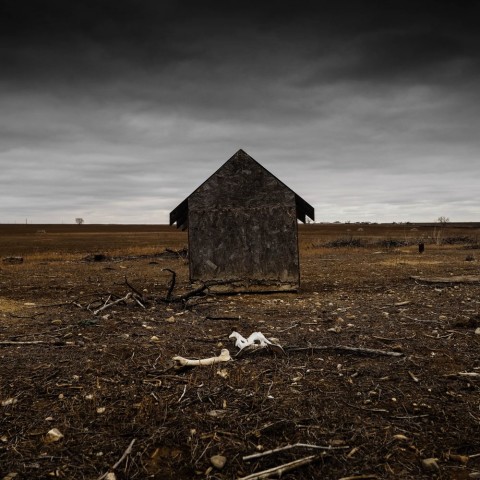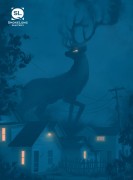She and I were one year married when we made the decision and waited for the papers to remove the priest’s words and our vows. I told myself we could fix this, that it was because of the village’s new hunger.
We’ll be better with full stomachs, I said.
With the decision came a body washed ashore. Flippers, baleen, and eyes too small. The creature dug ruts into the sand trying to roll back into the sea, to return to its family. Gasping breaths and a body like a hill. Small geysers from the stale air spit from its head.
I watched the creature starve and choke on the metal-thick air until its eyes unfocused and grayed. Before the other villagers could wake and stumble bleary-eyed and dry-lipped to this new harvest, I slung the axe, hoe, and shovel over my shoulder, tools that once dredged potatoes, cut buckwheat, and softened the rich dirt that had stopped saying I give. Now tools for cutting barnacled skin and heavy flesh packed tight into burlap.
Home: I called her from the door and held the sack open as it dripped red, grease, and sweat. She asked, Where did you get this? but took the bag from me without waiting for an answer. Her shirt hung loose and heavy on her shoulders. Her mouth already watered, chewing on imagined meat.
She rinsed the meat until the sea separated from sinew. In the pan, the fat blistered and melted, filling the kitchen with the smell of cold sand and iron. She tossed cubes of poached muscle in shallow bowls with pickled beets. With the blubber, she thickened pots of rice, more grit than grain.
She and I ate together, quiet except for the clank of chopsticks, spoons, the breaths between swallows.
After the meal, I lay on the floor and she sat at the bed, our lips slick with fat. How I wished for her to climb atop me like on our first night, to take me within her and bend so that I could taste that bitter salt of her skin. That she could look on my body bared that night and still desire.
Scientists came to study what was left of the animal on the beach. They split the bone-stretched skin, cut open the stomach, and found tools, dolls, and tables. They found pieces of metal from the city’s refinery, jagged shards made for staying, for sticking in dirt and proclaiming dominion.
It was underweight even with the metal, the scientists said, Its meat is toxic.
It was too late for much of the village. Already the fevers, the aches, the unremembering. The priest who had eaten the meat raw as sacrament sat in his bed one morning, questioning the man next to him. He failed to recognize the sloping shoulders or gold ring or rough beard bordering soft lips that repeated husband husband husband please.
She spoke of forgetting as a blessing, as breathing. She said, This will make the separating easier.
I hid lists around our bedroom, an exercise in clutching or reminding. In the margins of newspapers, I wrote the color of her eyes, her favorite flower, the shape of the birthmark on her hip. In the Bible, over passages of begetting, I wrote the taste of her lips, her name, over and over, two syllables light as glass, and how often I called her by the first syllable, a sigh across her skin. On the calendar, I marked her birthday, her mother’s birthday, and the day that we had first moved here, when she said, I want to live here long enough to hear the boards creak, to mistake the sounds for ghosts.
But the amnesia never came for us. In the week after the creature’s arrival, the villagers unlearned their jobs, homes, and names, and I still slept on the floor each night, still dreamed of her lips those first nights when she said, I don’t want to become my father, and I said, You won’t, you won’t, not knowing what she even meant.
I thought her desperate when she took me to the shore with the tools and burlap. The creature had long decomposed. The bones, smoothed by salt and seagull and the tongues of children, stood as archways half-buried in the sand.
Still, she swung the axe at a vertebrae, breaking it like a dish.
Still, she boiled the bone shards in seawater to turn the marrow to soup. How thin and clear the broth. How the bones had little left to give.
Still, she said, Drink this. A taste like cut grass and the memory of milk. How quickly the potion weighted my eyes. How I dreamed of my fingers curled together as one. My skin shone blue in the ocean. I swam with my lips parted and felt her pass through my bristled teeth and down my throat as krill, algae, dandelion petals.
Lips to my left ear, she said, My mother told me that whales grow gold in their chests.
She said, It’s nice to imagine the gold in their bodies, all the things formed and left behind.
I said, Would it have been easier to pretend to forget? Would we have been happier?
I said, I should have been better.
I felt her shake her head, the tickle of her hair against my lungs or the hollow of my neck. She said, It’s not about being better. It’s about what we started with.
Sunset: I awoke from my daze, limbs sticky with sea and sand, reaching for her shape, alone. I would stumble home to where her shoes and tools should have been. I would smooth her empty bedspace searching for what I already knew. The calendar would be missing from its nail.
But there on the shore, where the waves kissed the sand, I called out her name and felt the parts of her still stuck in my neck and knees and baleen teeth, a feeling like waiting or forgetting.
______________________
“Whale Fall” won first prize in The SmokeLong Quarterly Award for Flash Fiction (2018).


